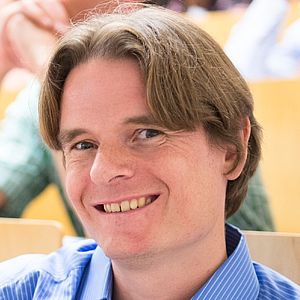Digital humanities in search of new paths – AI-generated image using Adobe Firefly.
From 26 February to 1 March 2024, the conference "Quo Vadis Digital Humanities?" will be held at the University of Passau. Marco van Leeuwen, Professor of Historical Sociology and Social Science History at Utrecht University, will be delivering the open keynote address on Tuesday, 27 February, at 18:00 in lecture theatre 10 of the Audimax Building. He researches solidarity and social inequality from a historical perspective. Professor Michaela Mahlberg, PhD, from the University of Birmingham has been invited to hold the closing address on Friday, 1 March, at 13:00 in lecture theatre 5 at the School of Business, Economics and Information Systems. With her, the organisers have managed to enlist the support of an expert in computer-assisted, quantitative linguistic methods, which she uses to examine vast text corpora for an understanding of the social function of language. Her lecture will also be open to the public.
The remaining workshops, panels, and sessions will be internal events. The German-speaking representatives of the European Association of Digital Humanities convene annually at various locations in Germany and other German-speaking countries. It has been ten years since they first came together in Passau, and they are taking the tenth anniversary of the conferences as an opportunity to meet again in the City of Three Rivers. DHd – Association for Digital Humanities in the German Speaking Areas is organising the event in collaboration with the Chairs of Digital Humanities and Multilingual Computational Linguistics of the University of Passau.
Together with the research community and interested parties, we will be exploring the boundaries of digital humanities and sound out innovative paths for the future of the discipline."
Professor Malte Rehbein, Digital Humanities, University Passau
"We are delighted to have successfull brought the Digital Humanities conference back to the University of Passau. Together with the research community and interested parties, we will be exploring the boundaries of digital humanities and sound out innovative paths for the future of the discipline,” says Professor Malte Rehbein, holder of the Chair of Digital Humanities. He has been researching formal and computer-assisted methods and their possible applications to address tasks and issues in the humanities and cultural studies for over ten years. His particular interest is in the history of human cultures and societies.
The diversity of languages is the key to understanding the world. The enormous technological developments in recent years have opened up completely new methods for comparing languages."
Professor Johann-Mattis List, Multilingual Computational Linguistics, University of Passau
Co-organizer Professor Johann-Mattis List, who holds the Chair of Multilingual Computational Linguistics, focuses his research on linguistic variation. "The diversity of languages is the key to understanding the world. The enormous technological developments in recent years have opened up completely new methods for comparing languages. I am very much looking forward to the discussion here in Passau with leading representatives of the field,” explains Professor List.
Over the past decade, digital humanities (DH) has established itself internationally as an interdisciplinary field at the interface between the humanities and computer science. A focus in this area has also emerged at the University of Passau, as demonstrated by the establishment of the Passau Centre for eHumanities with funds from the Federal Ministry of Education and Research. The Centre benefits from being on the university campus with its acclaimed computer science faculty, which is both fundamental and application-oriented, and from its integration in the Technik Plus chairs on related subject areas, including data science. The discipline has also received a fresh impetus from the Hightech Agenda of the Free State of Bavaria, leading to the creation of new chairs and professorships at the University of Passau that do research on smart language models and AI model development.
The #DHd2024 conference offers an opportunity to take stock and develop future perspectives within the discipline. The community has grown steadily over the past ten years, just as the research fields and areas of application in the digital humanities have changed and developed. Digital methods and working practices have found their way into everyday research and all areas of life; digitalisation has become part of the public discourse, as illustrated by artificial intelligence or big data. The digital humanities have thus always had the task of accompanying this process and substantially contributing to it, particularly also with a view to formulating possible interpretations and providing support.
Professor Johann-Mattis List
How to compare the over 6 000 languages spoken around the world, and how do computer-based methods help?
How to compare the over 6 000 languages spoken around the world, and how do computer-based methods help?
Comparative Linguist Johann-Mattis List has held the Chair for Multilingual Computational Linguistics at the University of Passau since January 2023 and heads the ERC-funded research group "ProduSemy". Before that, he served as stand-in professor at Bielefeld University and as senior researcher at the Max Planck Institute for Evolutionary Anthropology in Leipzig and the Max Planck Institute for the Science of Human History in Jena where he headed another ERC-funded research group on computer-assisted language comparison. Professor List earned his doctorate at the Heinrich Heine University in Düsseldorf and wrote his habilitation at the Friedrich Schiller University in Jena.

Professor Malte Rehbein
How can historical sources be digitalised and assessed with the assistance of computers?
How can historical sources be digitalised and assessed with the assistance of computers?
Professor Malte Rehbein has held the Chair of Digital Humanities at the University of Passau since 2013. He is a member of both the board of Digital Humanities in German Speaking Countries and the Scientific Advisory Board of Deutsches Museum.


